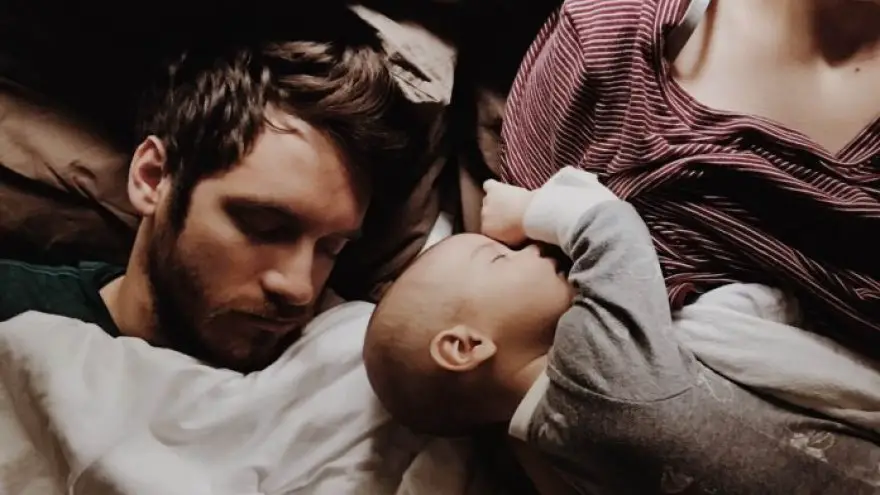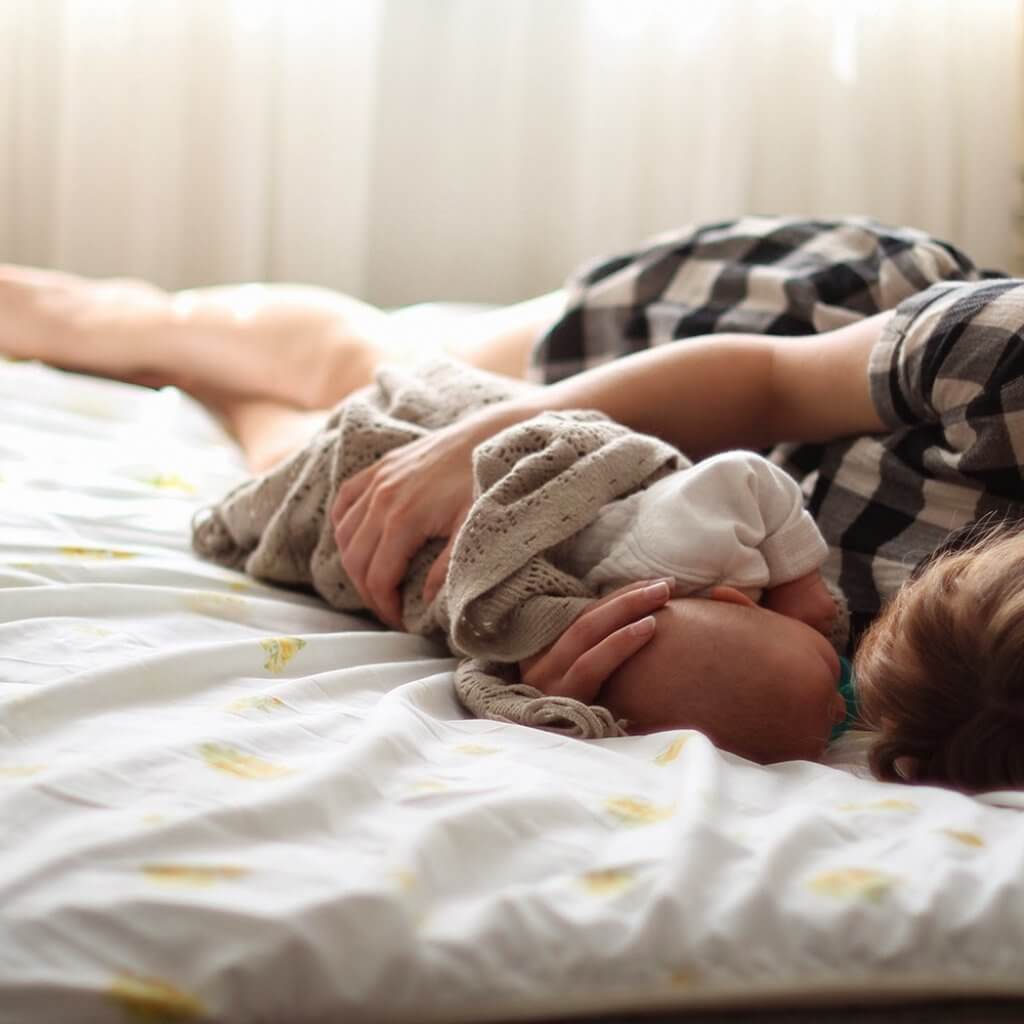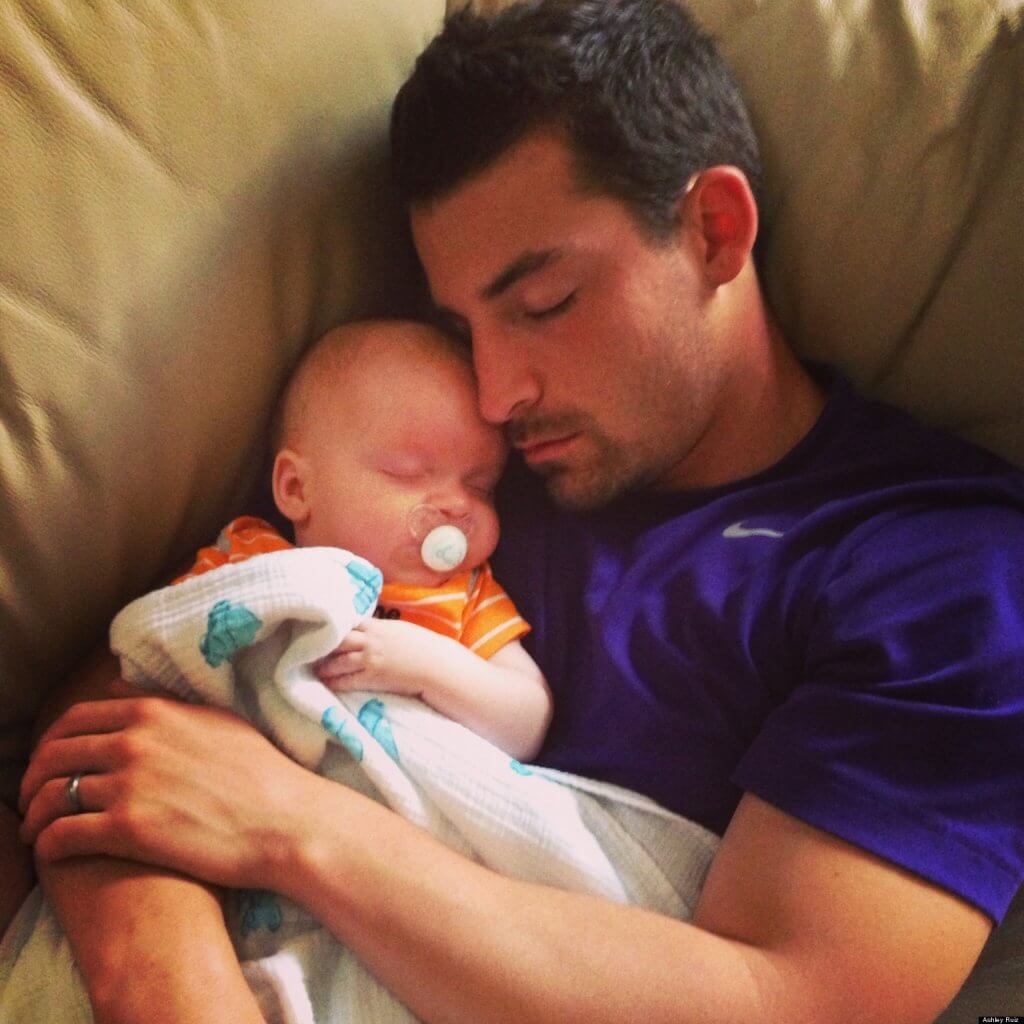Benefits of Co-Sleeping with Your Baby

Talk to anyone after you have your baby and one of the first questions out of their mouths will likely be to ask how much your baby is sleeping at night. Some babies seem to immediately sleep throughout the night whereas other newborns have a schedule that keeps mom and dad up most of the night feeding and changing diapers. Whether you’ve talked with friends and family about it or simply came up with the idea yourself, chances are that you’ve given some thought to co-sleeping.
Co-Sleeping is…….
The term co-sleeping means that both baby and mother are in close proximity to each other; be it in the same bed, or close enough in the same room as to respond to each other’s sensory signals. Co-sleeping, whether done with your baby in the same bed as you or just in the same room, has a large following of advocates both in the United States, and abroad.
While traditionally more common in overseas countries, co-sleeping is attracting more attention and study here at home for a variety of reasons. Both of my boys shared our bed with us for the first couple of years of their lives, and while it wasn’t always a popular idea with the friends and family that we discussed it with when the conversation came up, it worked out great for us.
So, if you’re considering the idea but still have some doubts about the benefits of co-sleeping, here are some things worth considering.
Improved Bonding and Attachment

It’s common these days that after a maternity leave period, mom has to go back to work. Co-sleeping offers an opportunity to bond and create a secure attachment between baby and parent. When your baby sleeps close by at night they feel secure in your presence and it aids in releasing oxytocin, also called the “love hormone”.
When you are near by and able to rapidly meet your baby’s needs, they feel more secure and learn that their needs will be quickly met, which decreases their stress levels. Because nighttime is also a period of few interruptions and distractions, co-sleeping provides an excellent opportunity to just spend time with your baby, increasing the bond between mommy and child.
Develops Independence
It may seem counterintuitive that co-sleeping builds independence in babies, but recent studies suggest that’s exactly the case. I lost count of how many people that we talked to that told us that co-sleeping would make our boys clingy and overly attached to us. In fact, research has found that children who share a bed with their parents suffer far lower levels of separation anxiety and require transitional objects in fewer instances.
Even more surprising, children that were raised by co-sleeping almost never end up sucking their thumbs. The sense of security that they develop through co-sleeping with their care givers actually enables them to develop a healthier level of personal independence as they grow. So, if your concerns are that your baby will become overly dependent or attached to you by co-sleeping, fear not, the science says otherwise.
Lower Chance of SIDS and Stress Disorders
Michael Commons, a Harvard psychiatrist who has spent years researching co-sleeping, has found that the chances of both stress disorders and SIDS is increased in babies who sleep alone. Because co-sleeping babies are in close proximity to their mothers, they experience a regulation of sleep state, heart rate, body temperature, breathing, and waking patterns. When babies are left alone to cry, they have shown to display elevated levels of cortisol, a stress hormone that has been found to damage the developing brain.
Additionally, Commons has found links to difficulty in recovering from physical illnesses in babies that do not co-sleep with their parents. That doesn’t mean of course that all babies who sleep alone will have brain development problems or stress disorders, but the effects of crying alone in their crib for extended periods of time can have a negative impact.
Daytime/Nighttime Pattern Development
Many babies take some time to learn how to distinguish daytime from nighttime. You may find that your baby sleeps more soundly during the day despite the added light and noise, and are seemingly more awake and alert at night even though the house is more quiet and dark. Co-sleeping means that your baby’s nighttime needs, such as feeding or diaper changes, are met faster and therefore they are able to stay in a semi-sleep state. When your baby is awake and crying for a while before you’re able to attend to them, they come out of their sleep state and take more time to get back asleep.
Babies also sleep more soundly when they feel more secure, and laying them down in a room by themselves at night could cause them to detect their isolation and not sleep as well. This not only means less sleep for the baby, but for mommy as well.
More Rest for Mom

There is a lucky small percentage of mothers out there that have had babies that instinctively sleep through the night. For the rest of us, nighttime means plenty of periods of waking up to feed the baby and change diapers, or even just rock the baby back to sleep for a while.
When your baby is in another room, chances are that that means getting up, going to their room, taking them out of the crib, and then attending to their needs. This often means that both mom and baby are completely awake before the event is over. Co-sleeping allows mom to tend to the baby’s needs faster and with less chance that the baby will completely wake up, which means that both mom and baby get back to sleep faster.
When it comes to working mothers, or mothers of multiple children, more rest at night can have huge affects on not only their moods and mental health, but physical health as well. Brains and bodies that are deprived of rest are more prone to illnesses and accidents throughout the day.
Safer Than a Crib
This one may sound a little far-fetched, but hear me out. The conventional wisdom certainly supports the idea that when a baby shares a bed with adults, the risk of nighttime mortality should go up. After all, with lots of bulky pillows, big fluffy blankets, and exhausted parents tossing and rolling all night, a parent’s bed certainly seems more dangerous than a spartan crib containing a firm mattress, mesh side skirts, and a lack of blankets and pillows.
However, when The Consumer Product Safety Commission released their data on adult-bed infant mortalities, while the risk was certainly there, over 3 times more instances of crib related infant mortality events occurred than those in adult beds. Other studies have shown that bed-sharing co-sleeping did not increase the risk of SIDS, except in the instances where the mother was an alcohol abuser or smoker.
Does that mean that adult beds are inherently safe, and cribs are inherently dangerous? Of course not. A number of factors determine the outcome of either instance, and valid arguments can be made for either case. What it does mean is that just because conventional wisdom tells us that co-sleeping is dangerous, a large body of scientific research has proven otherwise. Whichever you choose, bed or crib, taking certain considerations and precautions is always wise.
Easier Bedtime Routine
When its time to go to bed, newborn babies can be as wise to the game as any toddler. When your baby recognizes their surroundings and learns that going into their dark crib at night means that they will be alone, their anxiety levels can go up resulting in one very upset baby. This means that it takes longer for your baby, and you, to get to sleep.
Co-sleeping, whether in bed with you or in a crib or bassinet placed in close proximity to your own bed, can reduce your babies stress at bedtime and keep them calm. That means that when it’s time to sleep, both you and baby will be able to get to sleep faster and stay asleep longer.
Bonding Time for Dad

When it comes to parenting a newborn, dad often gets very little of the limelight. There could be a good reason for it; with less paternity leave given, an inability to breastfeed, and just different instinctive wiring, dads are just on a separate level than moms when it comes to baby-time. That could mean less opportunity to develop a bond between the two.
If you choose to co-sleep, both dad and baby have more time to bond and dad gets to participate in more of the nighttime routines. This could help foster a deeper relationship early on for them both, which could translate to your baby being more comfortable with dad performing some of the roles that mom normally has to.
Saves Space
In a perfect world, all of us have homes with sufficient room for everyone in the family. Siblings have no need to share a room and that spare bedroom is for guests rather than accumulated stuff with nowhere else to go. In reality, not every household has an abundance of room for everyone to get their own personal space. Some families have 2, 3, or more children of various ages sharing a room.
For several years growing up, my brother and I did not even have a bedroom; needing instead to wrestle over which one would get the couch and the other the floor, night after night. Co-sleeping, either bed-sharing or just room-sharing, allows you to delay the task of putting more than one child in a room, especially when one of them is a newborn.
By sharing your room until the baby is a toddler, you can allow your other child or children to enjoy their private personal space until it’s time to double up. A young child sharing his or her room with a toddler is much different than sharing it with a newborn who has frequent nighttime needs. For us, co-sleeping allowed us to use my youngest son’s room as a guest room for family and friends, (we live more than a few states away from any family members), until he was old enough to need his own personal space.
If you and your family are considering co-sleeping when your baby arrives, it’s important to consider all of the pro’s and con’s. There’s risk involved with any option you choose, just as there are ways to mitigate that risk. Consider things such as you and your spouses sleep habits, type of bedding, (if you choose to bed-share), space available in your home, day time rest requirements, and a variety of other things. Some other points to consider are the fact that babies are actually noisy little things to share a room with.
If you feel the need to pick up and cuddle your baby every time they make a sound of burp, that could mean less sleep for either of you. The good news is that in most cases, nothing is set in stone and your family is free to try different things to see which options work best for your specific situation. After all, if we had stopped and asked what family and friends thought we should do, we’d probably not have had the amount of rest or bonding with our boys that we now have. But that’s what worked for us, as always, your mileage may vary.







